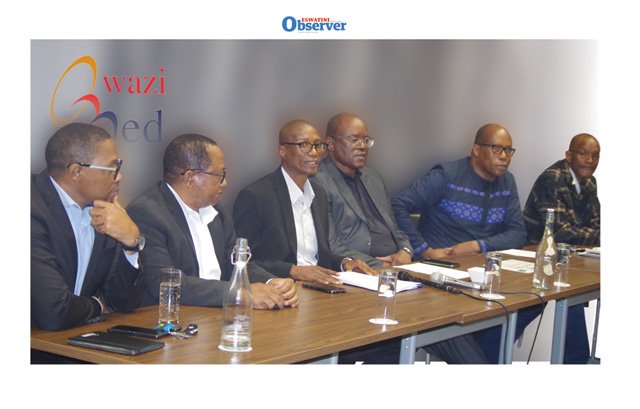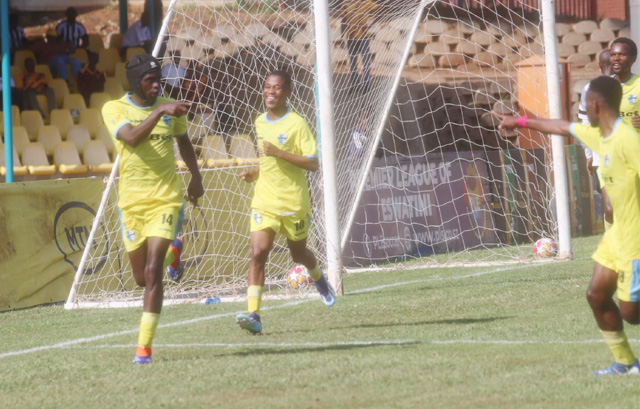By BODWA MBINGO | 2023-03-24

The United States of America (USA) has noted a political will to hold a national dialogue from all stakeholders, particularly His Majesty King Mswati III, civil society and other actors, within the country in a year when national elections will be held.
US Department of State Deputy Assistant Secretary (DAS), Bureau of African Affairs, Robert Scott in a digital press roundtable organised by the Africa Regional Media Hub yesterday, told the media that everybody he met with while in the country acknowledged that the dialogue needed to occur.
While in the country, he said he teamed up with the team from the US embassy to Eswatini at a time that had been highlighted by the upcoming national elections and a call for a political dialogue.
Scott said this was at the centre of his interaction with government, civil society and the media.
He said what they were calling for was a rapid engagement towards the dialogue, but also do not want to be in a position where they were saying that by this date, what should have happened.
It was also his understanding that the king had made previous statements regarding the need and his acceptance and support for the dialogue.
He said all that was needed now was for the people of Eswatini, the leaders of the country and non-governmental organisations to arrive at a way forward.
Scott noted that there were many other political actors, including the Southern African Development Community (SADC) through its Troika and African Union (AU) to engage.
“I think it’s there (the political will). It is a question of taking the first step and being able to agree to a forum and it is our hope that this will occur. Again, we can’t prescribe, you know, it is our role to support the institutions that can make this happen so we engaged with civil society where there are partners for many actors, including the government and ready to support a move towards dialogue,” he said.
Yesterday’s event was meant to discuss Scott’s engagements with government and civil society in Zimbabwe and Eswatini during his recent visit, from March 1 to 8.
The DAS reiterated that the US government could not determine the method or the first step on this but that they join others in urging that the dialogue occurs.
“We are engaged and our team at the embassy will do anything possible to assist in the process that will lead to this dialogue or call it a conversation or an open forum for discussions or whatever you want to call it. We will continue to be there,” he said.
Scott explained that the trip was part of his regular duties, visiting embassies in Southern Africa.
“It was an opportunity for me to learn more about the situation on the ground and to provide messages from Washington,” he added.
He said the consistent message they sent to the government was that they were calling for peaceful elections.
Adding, he said they raised an issue with both the government and civil society that all leaders should call for peace in the run up, during and after the elections.
“The question, which needs to come first and what we are saying is that they both need to progress in parallel so there needs to be, in our opinion, public progress towards a dialogue and that will reinforce a process towards again open and peaceful elections. So there shouldn’t be some kind of a false choice between one or the other preceding.”
Position
He said their position was clear that these go hand-in-hand and they were not saying which one should come before the other, but there needs to be progress on both, hence their call on all the actors to come forward and find a way to start a conversation.
“I think the word dialogue sometimes is almost a barrier because it is loaded and what I think is meant by that is an opportunity for the country at large and all the various actors who represent interests and groups to have an opportunity to talk, especially after the cycle of violence that occurred and which I think was shocking to everybody and is generating the need for this conversation,” he added.
‘We don’t support any politician, political party’
The United States does not support any politician or political party, but only supports the strengthening of institutions that allow citizens to express their will in democratic elections to choose their leadership.
This was an affirmation made by US Department of State Deputy Assistant Secretary (DAS), Bureau of African Affairs, Robert Scott, who also highlighted that they also strive to strengthen those institutions, which allow those citizens to hold those leaders accountable as should be the case in all other countries, including the United States.
“We have the same process underway here and it’s an ongoing process. So we have not resolved all these things and there are constant looks at how information is shared and which institutions need to be strengthened. We want to ensure that whether it’s opposition or ruling that every party or association has a chance to interact and that those institutions allow that to occur and are as strong as they can be,” he said.
He added that his country supports access to information in all Southern African countries for citizens to be able to hold governments accountable.
Support
Scott said they support, whenever possible, the passage of access to information laws and regulations, which allow citizens to hold governments accountable.
“We have the Freedom to Information Act here in the United States and many other countries have this kind of legislation and anything that allows the citizens and media to access information related to those that govern them or those chosen by them to govern them,” he said.
US not forcing anyone to take sides in Russia/Ukraine war
US Department of State Deputy Assistant Secretary (DAS), Bureau of African Affairs, Robert Scott has clarified that the United States is not forcing any country to choose between Russia and Ukraine in the ongoing invasion of the latter by the former.
He said what was happening was that the US and the world was making a case that if Russia’s actions were ignored, then that was a negative.
He said they were leaving this to every country to decide for itself, but their position was that they believe the actions by Russia in Ukraine were completely unjustifiable.
Scott said countries should consider this strongly when looking at votes at the United Nations (UN).
The DAS was speaking in relation to a recent UN General Assembly, which voted overwhelmingly, on the eve of the first anniversary of Russia’s invasion, in favour of a resolution calling for an end to the war and demanding that Russia leaves Ukrainian territory.
The non-binding resolution advocated for peace, reaffirmed support to Ukraine’s sovereignty and highlighted the need for accountability for war crimes.
Absataining
This is where Eswatini joined 34 others in abstaining from the vote.
“At the foundation of all this is our conviction and I think joined by the world at large that what Russia has perpetrated in Ukraine is a war of aggression. It has impacted not just the country of Ukraine and its citizens and we have seen the horrific destruction and death that have occurred there, but also in the continent of Africa as far as food security goes and other aspects. We saw the prices of grain skyrocket and fertiliser skyrocket directly due to the actions of Russia there,” emphasised Scott.
share story
Post Your Comments Below
Social media users have reacted with shock and sorrow to the death of former Mhlume Unite...

THE recent turn of events at SwaziMed has underscored deep-rooted governance challenges that thre...

Sisonkhe FC ……........….. (0)2
Mpendulo 55th, Thab...
Health officials have reported a significant decrease in new HIV infections among men, in...
All material © Swazi Observer. Material may not be published or reproduced in any form without prior written permission.
Design by Real Image Internet